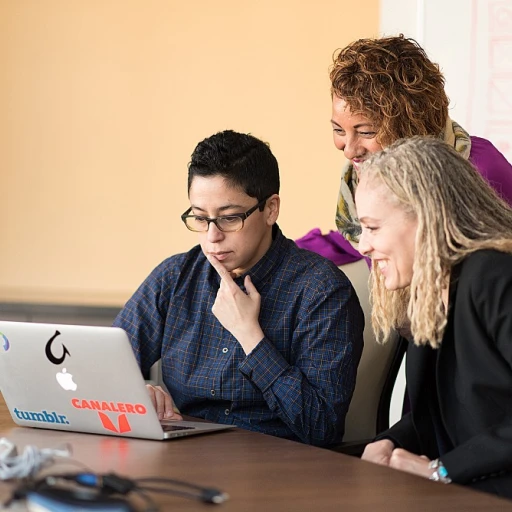
Understanding DEI in Candidate Meetings
Grasping the Essence of DEI in Candidate Interactions
Understanding Diversity, Equity, and Inclusion (DEI) within the context of candidate meetings is pivotal in addressing the systemic challenges often faced in recruitment processes. DEI goes beyond mere compliance with laws like Title VII and affirmative action in the United States. It's about fostering a recruitment environment where discrimination is diminished, and diverse talent is cultivated and empowered. An inclusive hiring process enables companies to tap into a broader pool of candidates, like individuals from different races, gender identities, and national origins. This not only aids in curbing discrimination and promoting equity in employment but also contributes to building a vibrant, productive workforce. Companies that leverage DEI effectively are likely to experience a diversity of thought and innovation, which are invaluable assets in today’s competitive job market. Creating a DEI-focused hiring process involves addressing bias and ensuring that all candidates perceive the process as fair. This requires comprehensive training programs for employees, particularly those involved in the hiring process, to sensitize them to unconscious biases and prejudices. Such initiatives help in cultivating an employment opportunity landscape where all candidates feel valued and respected. For HR professionals navigating these complexities, insights derived from open AI technologies and their application can be incredibly beneficial. These resources offer guidance in overcoming DEI-related challenges, thus making the hiring process more inclusive and equitable. For a more detailed exploration and insights, visit Navigating OpenAI Interview Questions: Insights for HR Professionals. Employing a strategic approach to DEI initiatives helps pave the way for building a diverse, equitable, and inclusive company culture. With the right mindset and tools, organizations can foster a sense of belonging among all employees, aiding in both talent attraction and retention.Technology's Role in DEI Initiatives
Technology Transforming DEI Efforts
In the evolving landscape of hiring practices, technology plays a pivotal role in advancing initiatives that support Diversity, Equity, and Inclusion (DEI). As companies increasingly focus on creating an equitable and inclusive workplace, innovative solutions are being integrated into the hiring process to mitigate discrimination. This involves efforts to address issues related to race, sex, and national origin and ensure a diverse workforce. Technology offers several tools that can significantly enhance DEI in candidate interactions:- Candidate Screening Algorithms: Advanced algorithms now help minimize unconscious bias by evaluating candidates based on skills and experience rather than race color or gender identity. This can lead to more equitable hiring decisions.
- DEI Analytics Platforms: These platforms offer insights into the demographic makeup of potential hires and workforce diversity. They enable companies to track and measure diversity metrics effectively, allowing for transparent DEI efforts.
- Training Modules and Resources: Comprehensive training programs integrated into the workplace prepare employees to foster an inclusive environment. They help educate the workforce about equity inclusion and the importance of diversity inclusion in everyday operations.
- Job Description Enhancement Tools: Tools such as job description bullet points generators can provide organizations an avenue to craft postings that attract diverse talent by emphasizing inclusive hiring and employment opportunities. For more information, check out enhancing efficiency with a job description bullet points generator.
Challenges in Implementing DEI Technologies
Tackling Challenges in Implementing DEI Technologies
Incorporating diversity, equity, and inclusion (DEI) initiatives in the hiring process involves more than simply integrating new technologies; it requires addressing inherent challenges that may hinder progress. These challenges, if not addressed, can render DEI programs less effective and potentially perpetuate existing disparities in employment opportunities. One prominent challenge is the risk of discrimination within data-driven technologies. While AI and machine learning offer innovative solutions to streamline the hiring process and enhance DEI, they can also unintentionally perpetuate biases present in historical data. This is particularly concerning when considering race, color, and national origin in employment decisions. The importance of filtering data meticulously cannot be overstated, ensuring that training algorithms do not reinforce discrimination based on race, sex, or any other protected class under Title VII. A second barrier is the reluctance or difficulty in adopting new technologies due to a lack of training or resistance to change within organizations. Employees and HR professionals need comprehensive training to effectively use DEI tools in a way that genuinely supports diversity and inclusion efforts. Without this, the technology itself becomes an obstacle rather than a facilitator of an equitable hiring process. Moreover, the integration of technology that supports DEI initiatives may also necessitate a cultural shift within companies. Creating an inclusive and diverse workforce goes beyond technology—it requires a commitment from leadership and employees at all levels to promote equity inclusion and combat diverse talent disparities. This holistic approach involves reshaping company culture, which can be a daunting task that requires patience, persistence, and dedicated resources. For companies looking to surmount these challenges, a clear understanding of their current DEI efforts and goals is crucial. Engaging with professionals who have expertise in both DEI and technology can provide valuable insights and strategies. Furthermore, leveraging efficient HR processes such as streamlining document management with Workbright can help structure a more transparent and inclusive hiring workflow, minimizing the risk of bias and supporting DEI hiring goals. Guide to Efficient HR Processes”Best Practices for DEI in Candidate Meetings
Implementing Best Practices for an Inclusive Hiring Process
To ensure that your company's hiring process is truly inclusive and equitable, it is essential to adopt best practices that align with your DEI initiatives. The implementation of these strategies not only fosters a diverse workforce but also enhances the company culture and boosts overall performance.- Comprehensive Training Programs: Providing thorough DEI training for all employees involved in the hiring process is vital. Training should focus on recognizing unconscious biases and understanding the legal frameworks like Title VII that prohibit discrimination based on race, color, national origin, sex, and more.
- Structured Interviews: Develop a standardized set of interview questions that ensures every candidate is assessed fairly and consistently. This helps to reduce bias and allows for an objective comparison of candidates based solely on their qualifications and competencies.
- Diverse Interview Panels: Ensure that interview panels themselves reflect diversity in terms of race, gender, and other aspects of identity. This approach not only demonstrates the company's commitment to DEI but also aids in better hiring decisions by incorporating diverse perspectives.
- Equitable Job Descriptions: Craft job descriptions carefully to avoid language that might unintentionally deter diverse talent. Phrases that appeal to a wider pool of candidates can contribute to an inclusive job listing, ultimately attracting a broader range of qualified candidates.
- Transparent Employment Opportunities: Encourage transparency in employment opportunities by openly communicating your company's diversity and inclusion policies. This transparency can enhance your company's reputation as an employer of choice among diverse talent.
Case Studies: Successful DEI Implementations
Real-World Examples of DEI Success
In the realm of diversity, equity, and inclusion (DEI), several companies have made significant strides by integrating innovative technologies into their hiring processes. These organizations serve as benchmarks for others aiming to enhance their DEI efforts.
Tech Company Revolutionizing Inclusive Hiring
One prominent tech company in the United States has effectively utilized AI-driven tools to mitigate bias in their hiring process. By implementing algorithms that focus on skills and experience rather than race, gender, or national origin, they have successfully increased the diversity of their workforce. This approach aligns with Title VII of the Civil Rights Act, which prohibits discrimination in employment based on race, color, or sex.
Higher Education Institution Embracing DEI Initiatives
A leading higher education institution has adopted comprehensive DEI programs that include mandatory training for all employees. This training focuses on recognizing unconscious bias and promoting an inclusive work environment. As a result, the institution has seen a notable increase in diverse talent among their faculty and staff, fostering a more inclusive academic community.
Retail Giant's Commitment to Equity and Inclusion
A major retail company has taken a proactive stance by launching a series of DEI initiatives aimed at creating equitable employment opportunities. They have implemented a robust affirmative action plan, ensuring that their hiring process is transparent and fair. This commitment has not only improved their company culture but also attracted a wider pool of candidates from various backgrounds.
Financial Sector's DEI Transformation
In the financial sector, one company has set a precedent by integrating DEI metrics into their performance evaluations. This approach ensures that managers are accountable for fostering an inclusive work environment. By prioritizing diversity inclusion in their employment practices, they have successfully reduced discrimination employment cases and enhanced their reputation as an employer of choice.
These case studies illustrate the tangible benefits of prioritizing DEI in candidate meetings and the broader hiring process. By learning from these examples, companies can better navigate the challenges of implementing DEI technologies and create a more inclusive and equitable workforce.













